Ryanair to test streaming movies to tablets and phones
- Published
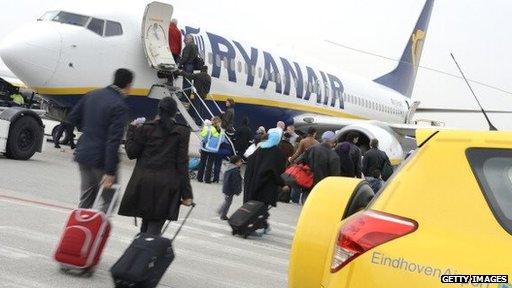
Ryanair says it plans to test streaming movies and television shows to passengers' tablets and smartphones.
The airline - which has become notorious for the fees it charges for add-on services - said the facility might be provided without charge.
Chief technology officer John Hurley said Ryanair might instead profit by adding adverts, paid for by businesses based in the cities being travelled to.
He added that trials were set to begin in the summer.
"It's aimed at passengers on flights of more than two or three hours," he said.
However, he told the Daily Telegraph, external that his firm was not looking to provide full internet access to passengers.
"It would increase the drag of our aircraft by 2%, which equates to 20 million euros [$23.6m; £15.5m] in extra fuel," Mr Hurley said.
In-flight wi-fi
United, Delta, Southwest Airlines and Jetstar are among companies that already allow passengers to stream videos to their personal devices via in-flight wi-fi systems on some routes in North America.
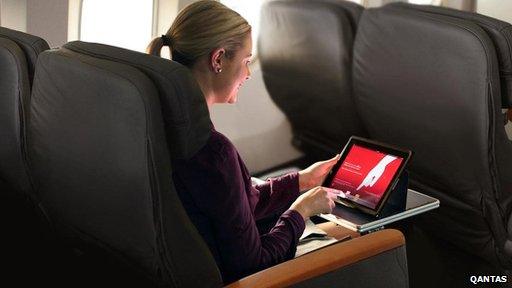
Qantas is among airlines to have already adopted in-flight streams to tablets and phones
These can be watched via a web browser using Adobe's Flash plug-in on a laptop or via dedicated apps for iOS and Android devices.
Qantas, Virgin Australia and Singapore Airlines' Scoot offshoot also offer a streaming service of their own, making it possible for customers to choose from a larger than normal selection of entertainment.
Meanwhile, JetBlue had begun offering up to 20 megabits per second (Mbps) satellite-based wi-fi connections on some US routes, making it possible to watch content via Netflix, Hulu or Amazon Prime if customers are willing to pay for the $9/hr premium service.
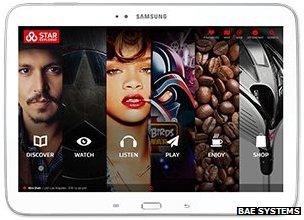
BAE Systems promotes its IntelliCabin tablet-based service as an alternative to seat-embedded tech
However, such facilities remain relatively rare in Europe.
Norwegian Air began a wi-fi enabled movie renting service in 2013, and UK airline Monarch followed with its MPlayer service last August, external.
Lufthansa has also introduced a streaming system on 20 of its Airbus aircraft operating on medium haul routes, offering newspapers and magazines in addition to video content via a proprietary technology.
"The guests need to download an app prior to the flight. For this purpose, announcements at the gates are made before boarding and flyers are distributed to promote the service," a spokesman told the BBC.
"Why do we have it only on a number of our total fleet? Because we believe that this offer is only interesting on longer routes, such as Lisbon, Tel Aviv, Athens, Moscow, Cairo, Baku etc."
Embedded v bring-your-own
These technologies pose a potential threat to Panasonic and Thales, which provide entertainment systems that can cost £6,500 or more to install per seat and can be costly to repair and upgrade.
Upgrade to in-flight entertainment?
Panasonic recently showed off a planned system that allows tablets to be used as a second screen, complementing the seat-back system, at the Consumer Electronics Show in Las Vegas earlier this month.
Emirates, external and Qatar Airways, external executives are among those who have said they intend to remain committed to such embedded systems for years to come.
But one expert suggested bring-your-own-device-based systems might have an edge, particularly if the airlines are able to take advantage of existing relationships with TV and movie studios.
"Even on long-haul flights you see people watching movies on their iPads even when there's a complimentary seat-back offer," said John Strickland, an aviation industry expert at JLS Consulting.
"People are now used to the independence and instantaneous response they can get from their own devices.
"If airlines can sell access to the latest movies or TV series that you might not otherwise be able to get for a decent price - and you're talking about hundreds of passengers on a flight and seven to eight flights a day on short-haul trips - then the airlines have to look at this seriously as they can't pass up the profit potential."
- Published8 January 2015
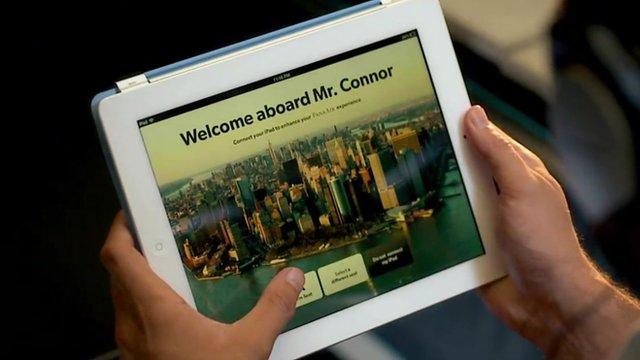
- Published30 December 2014
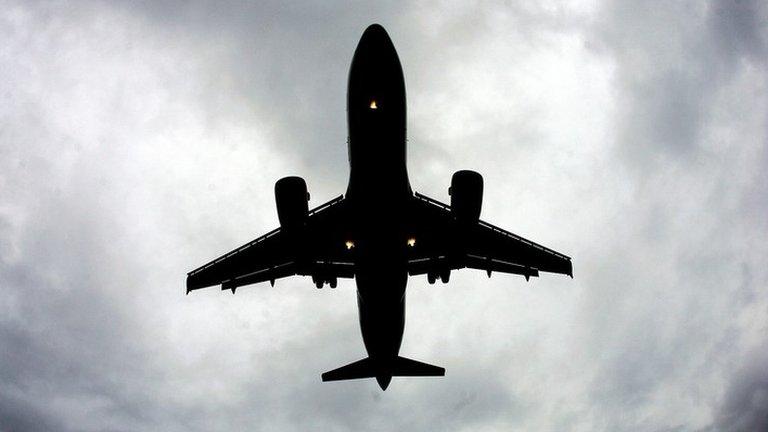
- Published11 July 2014
